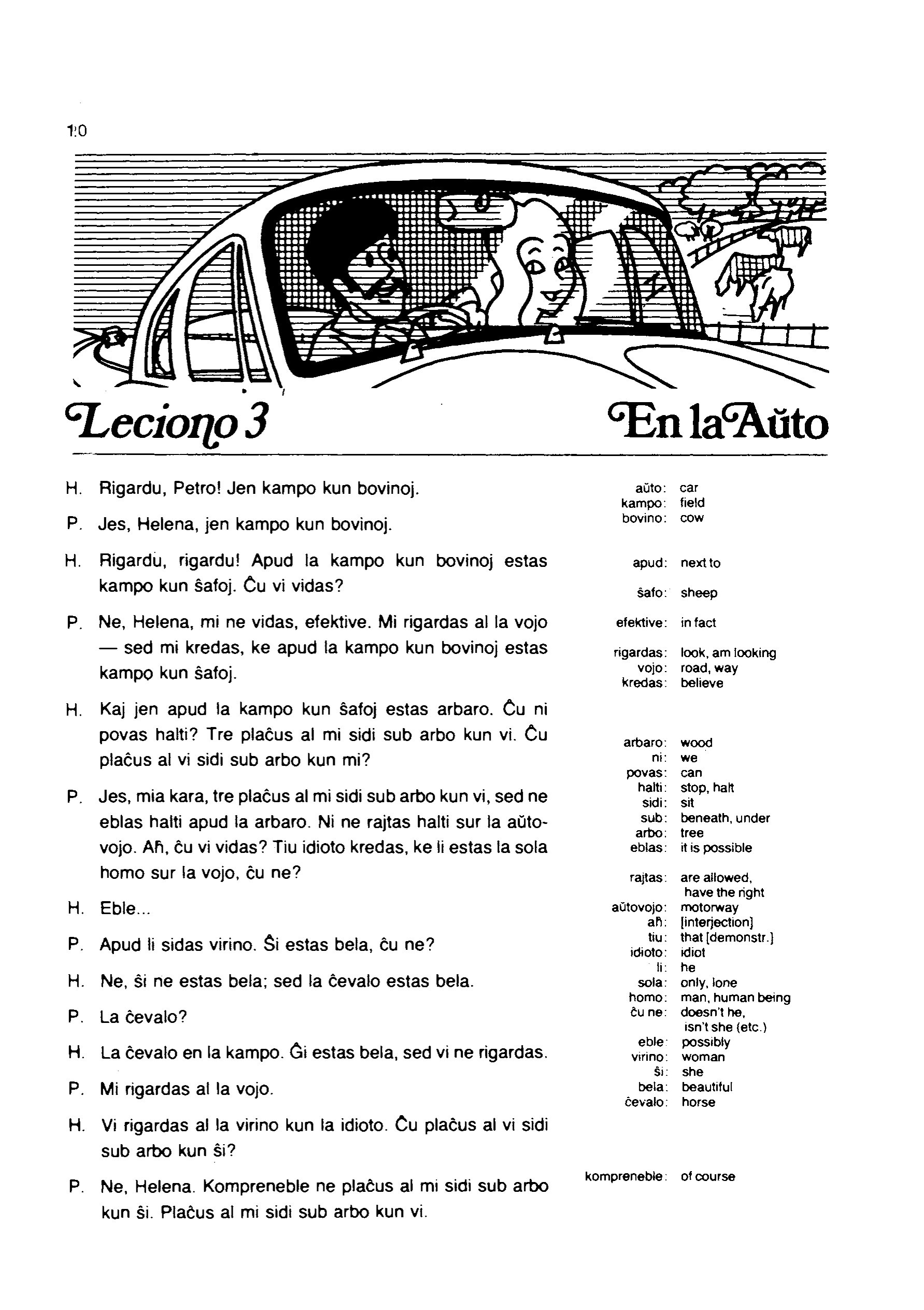
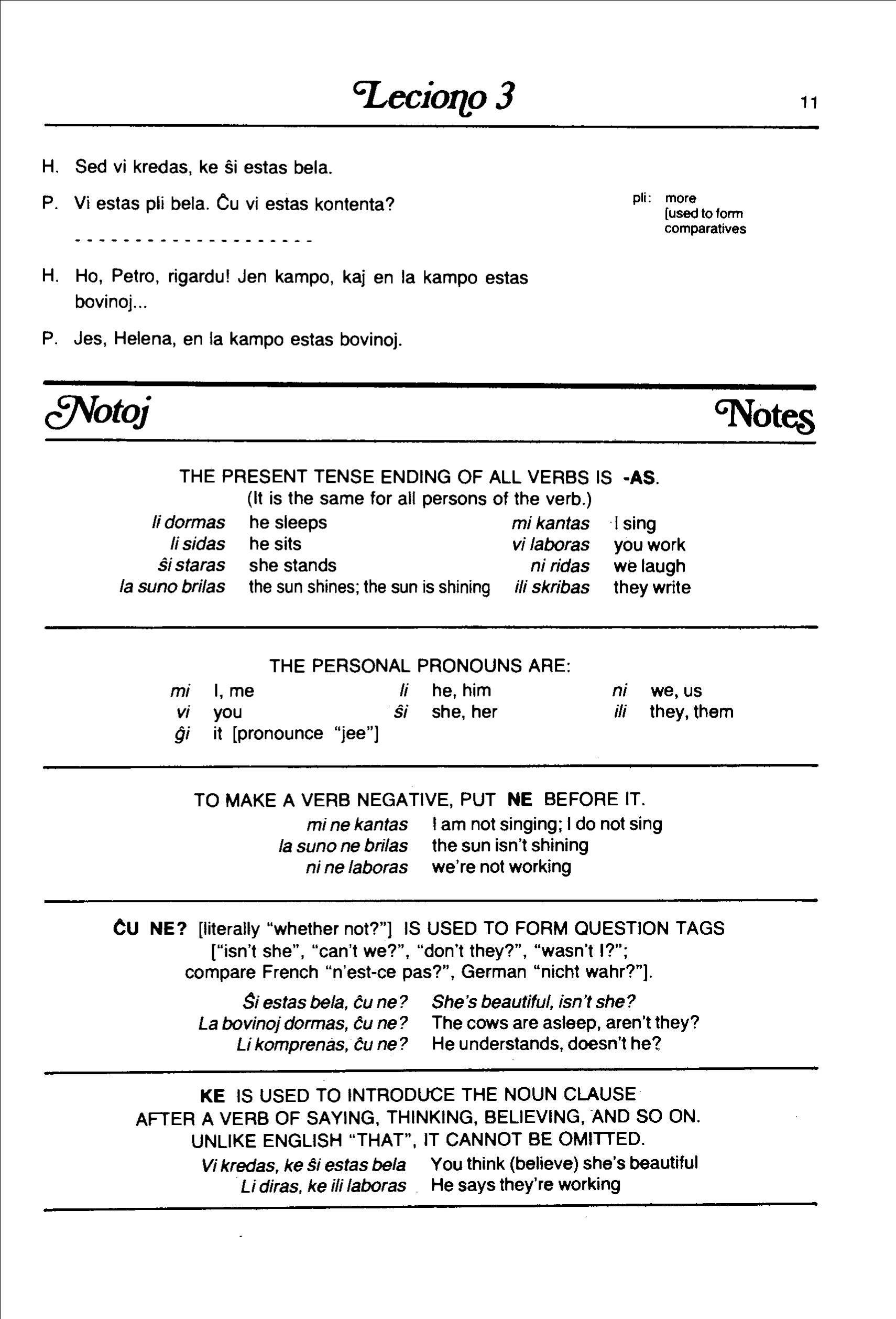
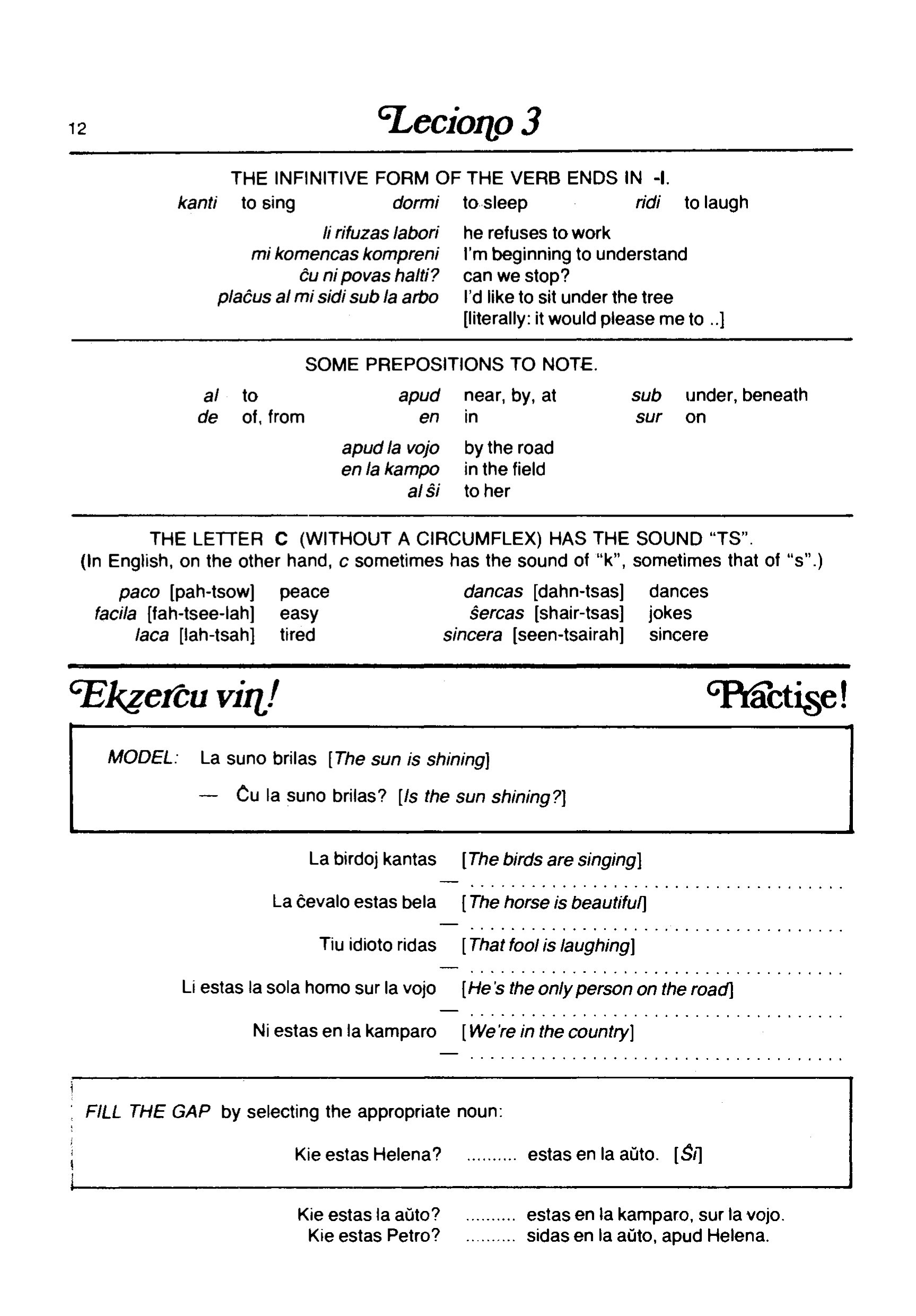
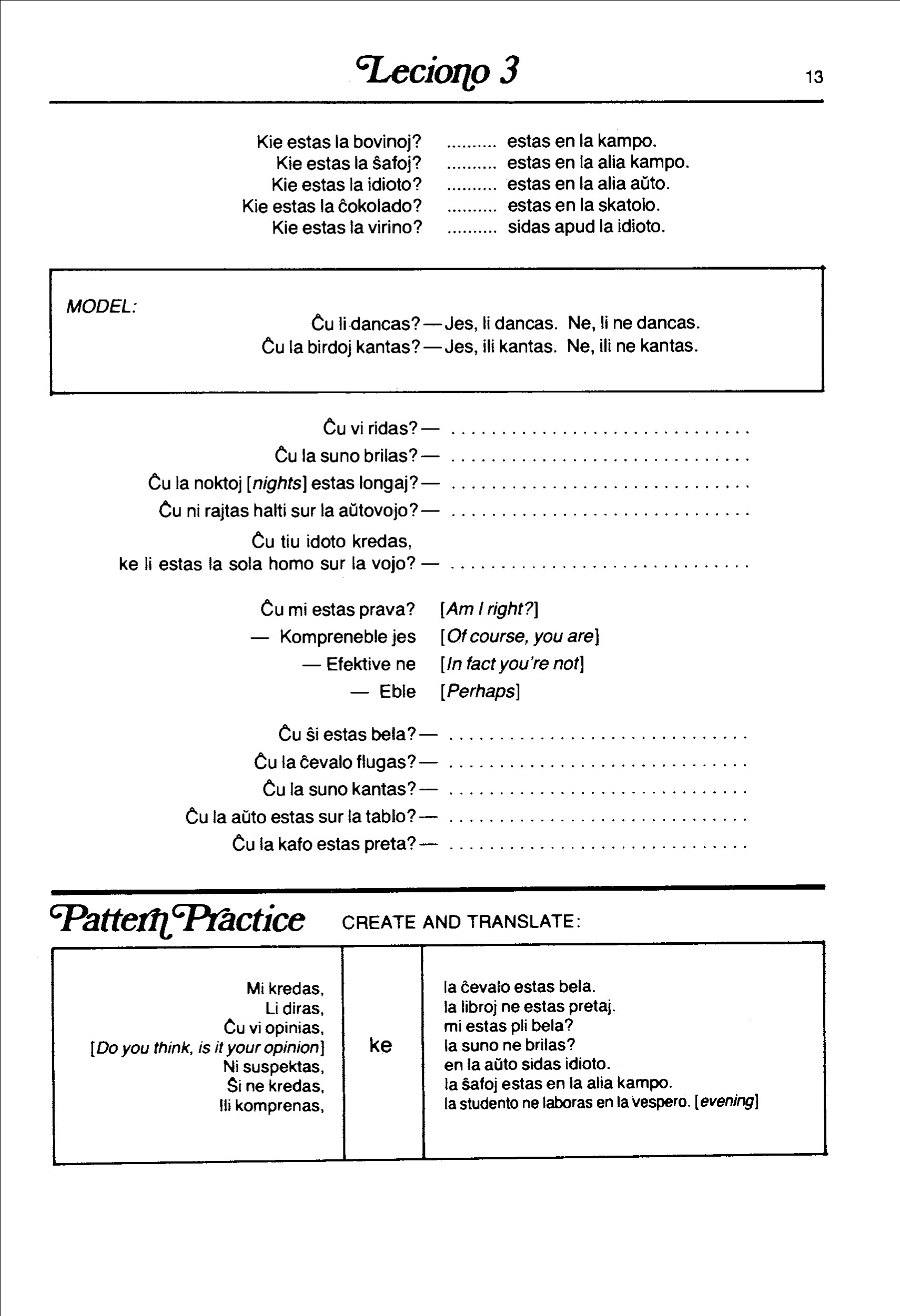
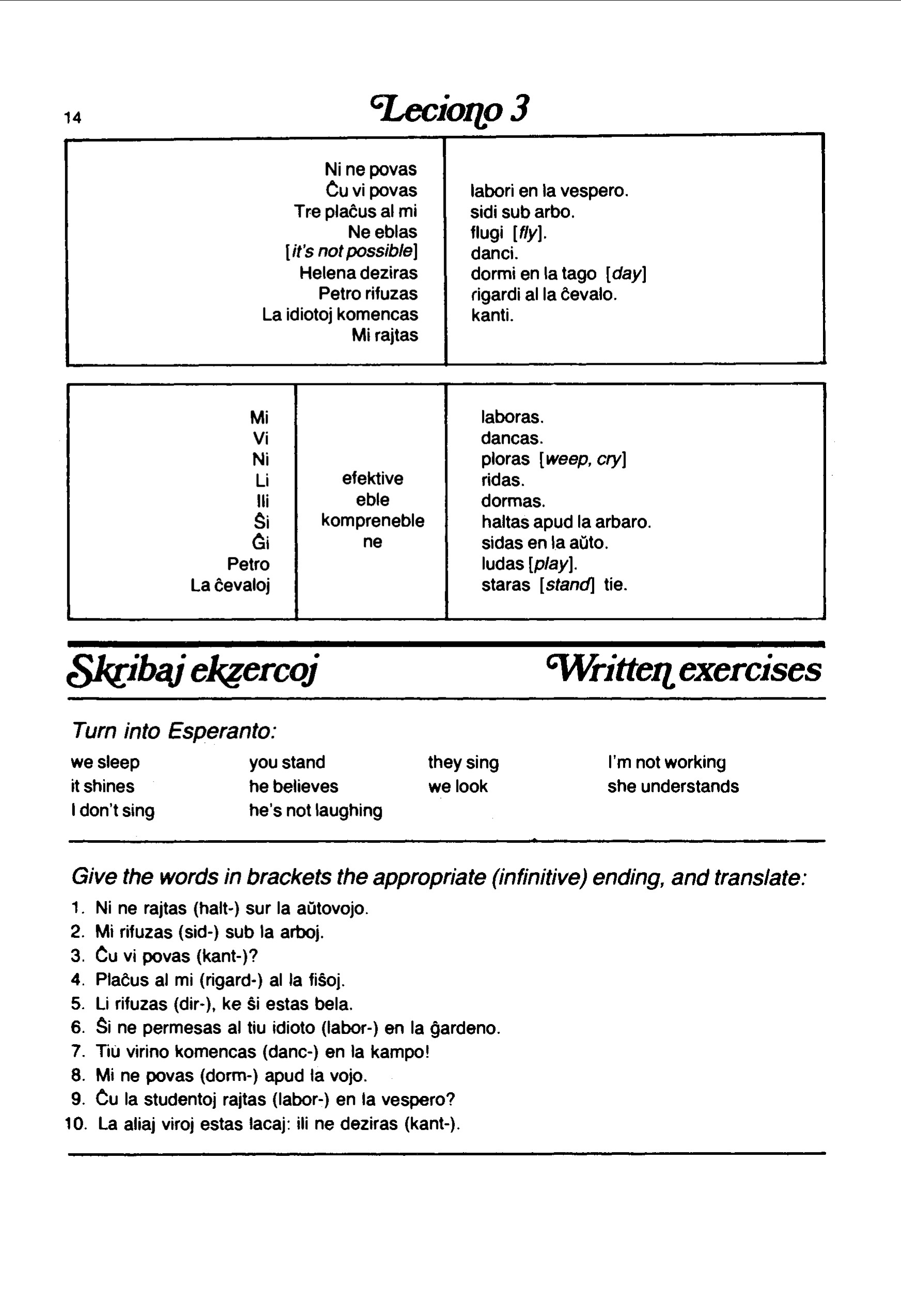
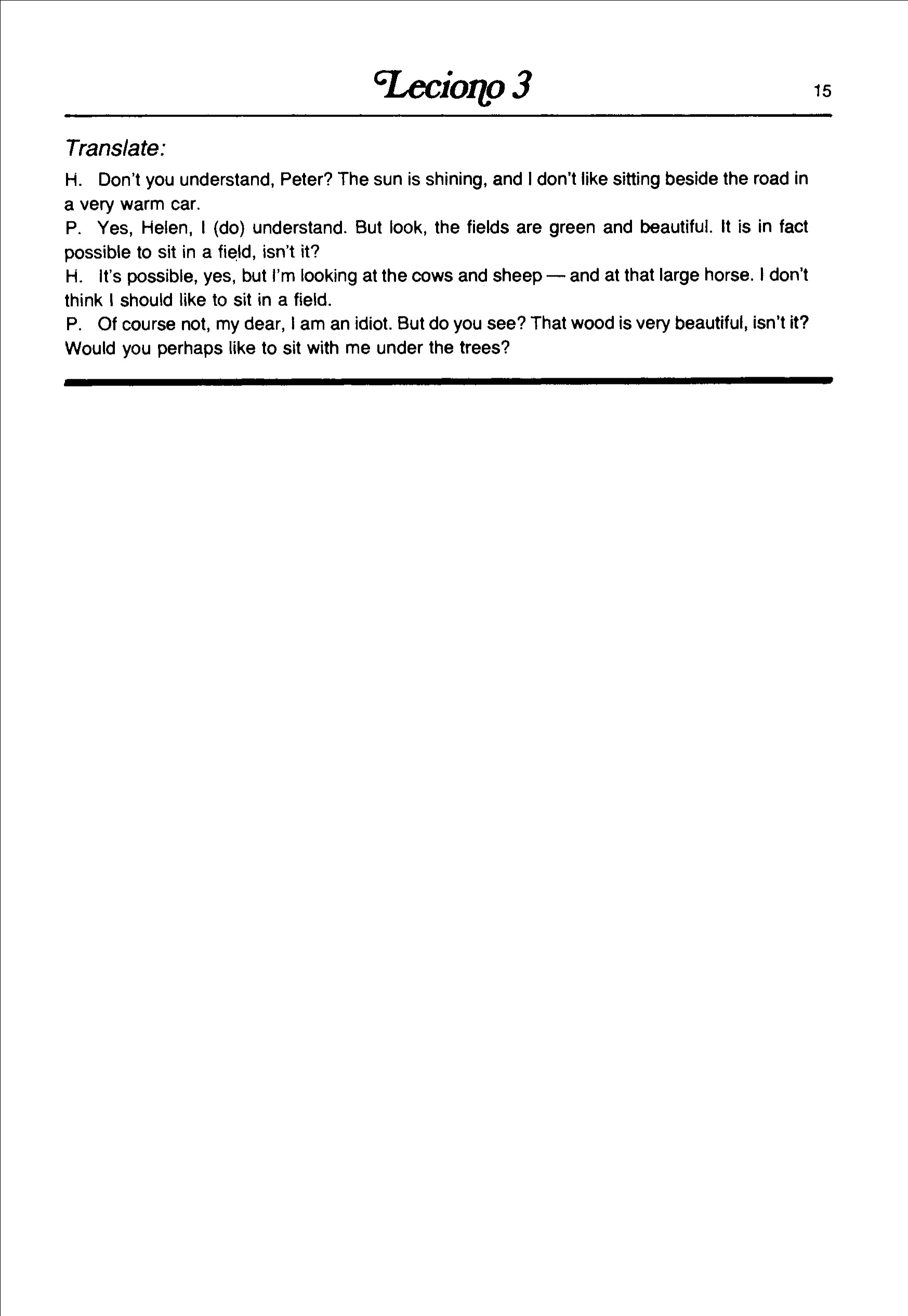

Answers are offered below
Did you write out ‘answers’ for Lesson 1. Add your new ones to them now. Has writing things out paid any dividends? Writing is another medium besides listening and talking. It is also visual. You see what you have written, which will help later. You have just seen how Esperanto nouns and adjectives ‘match’ their endings. Did you notice their sounds ‘harmonised’ too. Some other languages do this too. You will meet instances, where this harmony also helps Esperanto gain in clarity.
Please attempt the exercises before consulting the material below. There is a lot of new stuff in the lesson. It would pay to study it a few times.
Lesson 3 Example Answers / Ekzemplaj Solvoj
Page 12
Ekzercu vin!
La birdoj kantas – ĉu la birdoj kantas?
La ĉevalo estas bela – ĉu la ĉevalo estas bela?
Tiu idioto ridas – ĉu tiu idioto ridas?
Li estas la sola homo sur la vojo – ĉu li estas la sola homo sur la vojo?
Ni estas en la kamparo – ĉu ni estas en la kamparo?
Kie estas la aŭto? Ĝi estas en la kamparo, sur la vojo
Kie estas Petro? – Li sidas en la aŭto, apud Helena
paĝo 13
Kie estas la bovinoj? – Ili estas en la kampo
Kie estas la ŝafoj? – Ili estas en la alia kampo.
Kie estas la idioto? – Li estas en la alia aŭto.
Kie estas la ĉokolado? – Ĝi estas en la skatolo.
Kie estas la virino? – Ŝi sidas apud la idioto.
Ĉu vi ridas? – Jes, vi ridas. Ne, vi ne ridas
Ĉu la suno brilas? – Jes, la suno brilas. Ne, la suno ne brilas
Ĉu la noktoj [nights] estas longaj? – Jes, la noktoj estas longaj. Ne, la noktoj ne estas longaj.
Ĉi tiu idioto kredas, ke li estas la sola homo sur la vojo? Jes, tiu idioto kredas, ke li estas la sola homo sur la vojo. Ne, tiu idioto ne kredas, ke li estas la sola homo sur la vojo
Ĉu ŝi estas bela? – Kompreneble jes
Ĉu la ĉevalo flugas? – Efektive ne
Ĉu la suno kantas? – Efektive ne
Ĉu la aŭto estas sur la tablo? – Efektive ne
Ĉu la kafo estas preta – Kompreneble jes
Pattern Practice – Example creations
Mi kredas, ke en la aŭto sidas idioto : I believe an idiot sits / is sitting in the car
Li diras, ke la ĉevalo estas bela : He says the horse is beautiful
Ĉu vi opinias, ke mi estas bela? : Do you think I am beautiful
Ni suspektas, ke la libroj ne estas pretaj : We suspect the books are not ready
Ŝi ne kredas, ke la studento ne laboras en la vespero : She doesn’t believe the student doesn’t work in the evening (!)
Ili komprenas ke la ŝafoj estas en la alia kampo : They understand the sheep are in the other field.
Notes
‘ke’ [‘that’ – introducing a statement] must not be omitted in Esperanto as it ensures clarity at all times.
‘sidas’ – Esperanto prefers to use the simple form. It can translate ‘is sitting’ literally but prefers to use an adverb, if it needs to emphasise that an action is continuing over time. Similarly it expresses ‘does sit’ by ‘prefers to sit’ or by an adverb if the nuance is essential. Note that in negative statements English cannot use the simple form but must resort to using a participle or auxillary verb like ‘do’.
‘opinias’ – as always, stress the second last syllable – o-pi-NI-as
paĝo 14
Ni ne povas danci : We can’t dance
Ĉu vi povas flugi : Can you fly?
Tre plaĉus al mi labori en la vespero : I would like very much working / to work in the evening
Ne eblas dormi en la tago : It’s not possible to sleep in the day. OR Sleeping is not possible in the day.
Helena deziras sidi sub arbo : Helena wants to sit under a tree.
Petro rifuzas kanti : Peter refuses to sing
La idiotoj komencas labori en la vespero : The idiots started to work / working in the evening
Mi rajtas rigardi al la ĉevalo : I have a right to look at the horse.
Notes
komencas labori – starts working / to work Esperanto always uses the simpler, infinitive form.
Mi ne ploras – I am not crying
Vi laboras efektive – You really work / You really are working
Ni kompreneble sidas en la aŭto – We of course sit / are sitting in the car
Li ne dormas – He is not sleeping / does not sleep.
Ili eble ridas – They are possibly laughing / They may be laughing
Ŝi kompreneble dancas – She dances / is dancing of course
Ĝi efektive haltas apud la arbaro – It actually stops near the wood.
Petro eble ludas – Peter possibly plays / is possibly playing / may be playing
La ĉevaloj ne staras [stand] tie – The horses don’t stand / are not standing there.
Skribaj ekzercoj / Written exercises
We sleep – Ni dormas You stand – Vi staras They sing – Ili kantas I’m not working – Mi ne laboras
It shines – Ĝi brilas He believes – Li kredas We look – Ni rigardas She understands – Ŝi komprenas
I don’t sing – Mi ne kantas He’s not laughing – Li ne ridas
1. Ni ne rajtas halti sur la aŭtovojo – we do not have the right to stop on the motorway.
2. Mi rifuzas sidi sub la arbo – I refuse to sit under the tree.
3. Ĉu vi povas kanti? – Can you sing?
4. Plaĉus al mi rigardi al la fiŝoj – I would like to look at / watch the fish.
5. Li rifuzas diri, ke ŝi estas bela – He refuses to say she is beautiful
6. Ŝi ne permesas al tiu idioto labori en la ĝardeno – She does not allow the idiot to work in the garden.
7. Tiu virino komencas danci en la kampo! That woman is starting to dance in the field!
8. Mi ne povas dormi apud la vojo – I can’t sleep near the road.
9. Ĉu la studentoj rajtas labori en la vespero? – May (can) the students (Do the students have the right to) work in the evening?
10. La aliaj viroj estas lacaj; ili ne deziras kanti – The other men are tired; they do not want to sing
Note
Esperanto maintains the distinction between povi = ‘can, be able to’ and rajti = ‘have a right to’. You have also met permesi = ‘permit, give permission to/for’.
Translate / Traduku
H. Don’t you understand, Peter? The sun is shining, and I don’t like sitting beside the road in a very warm car.
Ĉu vi ne komprenas, Petro ? La sun brilas, kaj ne plaĉas al mi sidi apud la vojo en tre varma aŭto.
P. Yes, Helen. I (do) understand. But look, the fields are green and beautiful. It is in fact possible to sit in a field, isn’t it?
Jes, Helena. Mi (ja) komprenas. Sed rigardu, la kampoj estas verdaj kaj belaj. Efektive eblas sidi en kampo, ĉu ne?
H. It’s possible, yes, but I’m looking at the cows and sheep – and at that large horse. I don’t think I should like to sit in a field.
Eblas, jes, sed mi rigardas al la bovinoj kaj ŝafoj – kaj al tiu granda ĉevalo. Mi opinias, ke ne plaĉus al mi sidi en kampo.
P. Of course not, my dear. I am an idiot. But do you see? That wood is very beautiful, isn’t it? Would you perhaps like to sit with me under the trees?
Kompreneble ne, mia kara. Mi estas idioto. Sed ĉu vi vidas? Tiu arbaro estas tre bela, ĉu ne? Ĉu eble plaĉus al vi sidi kun mi sub la arboj?
Lesson 3 – Words enable conversation!
Aĥ
Apud
Arb/o
Arb/ar/o
Aŭt/o
Aut/o/voj/o
Bel/a
Bird/o
Bov/in/o
Bril/i
Ĉeval/o
Danc/i
Dorm/i
Ebl/e
Ebl/as
Efektiv/e
Facil/a
Flug/i
Halt/i
Hom/o
Idiot/o
Kamp/o
Kamp/ar/o
Kant/i
Ke
Komenc/i
Komprenebl/e
Kred/i
Labor/i
Lac/a
Li; al li
Lud/i
Ni; al ni
Nokt/o
Opini/i
Pac/o
Pli
Plor/i
Pov/i
Prav/a
Rajt/o
Rajt/i
Rid/i
Rifuz/i
Romantik/a
Sid/i
Sincer/a
Skrib/i
Sol/a
Star/i
Sub
Sun/o
Suspekt/i
Ŝi; al ŝi
Tag/o
Tiu
Vesper/o
Virin/o
Voj/o
Ah! (interj.)
Near/next to
Tree
Wood cf arbour
Car cf automobile
Motorway/ freeway
Beautiful
Bird
Cow cf bovril (!)
Shine cf brilliant
Horse cf cavalier
Dance
Sleep cf dormant
Possibly, perhaps
It is possible
In fact
Easy cf facility
Fly
Stop, halt
Man, human being
Idiot, fool
Field cf camping
Country(side)
Sing cf canticle
That (conjunction)
Begin cf commence
Of course
Believe cf creed
Work cf labour
Tired
He; to him
Play cf Ludo
We; to us
Night cf nocturnal
Opine, think
Peace
More
Cry, weep cf deplorable
Be able to
Right, justified
Right, privilege cf a right
Be entitled to
Laugh cf ridicule
Refuse
Romantic
Sit i.e. be seated
Sincere
Write cf scribe
Alone cf solo
Stand
Under cf subway
Sun
Suspect
She; to her
Day cf Tag Gr
That, that one
Evening cf vespers
Woman
Way, road
